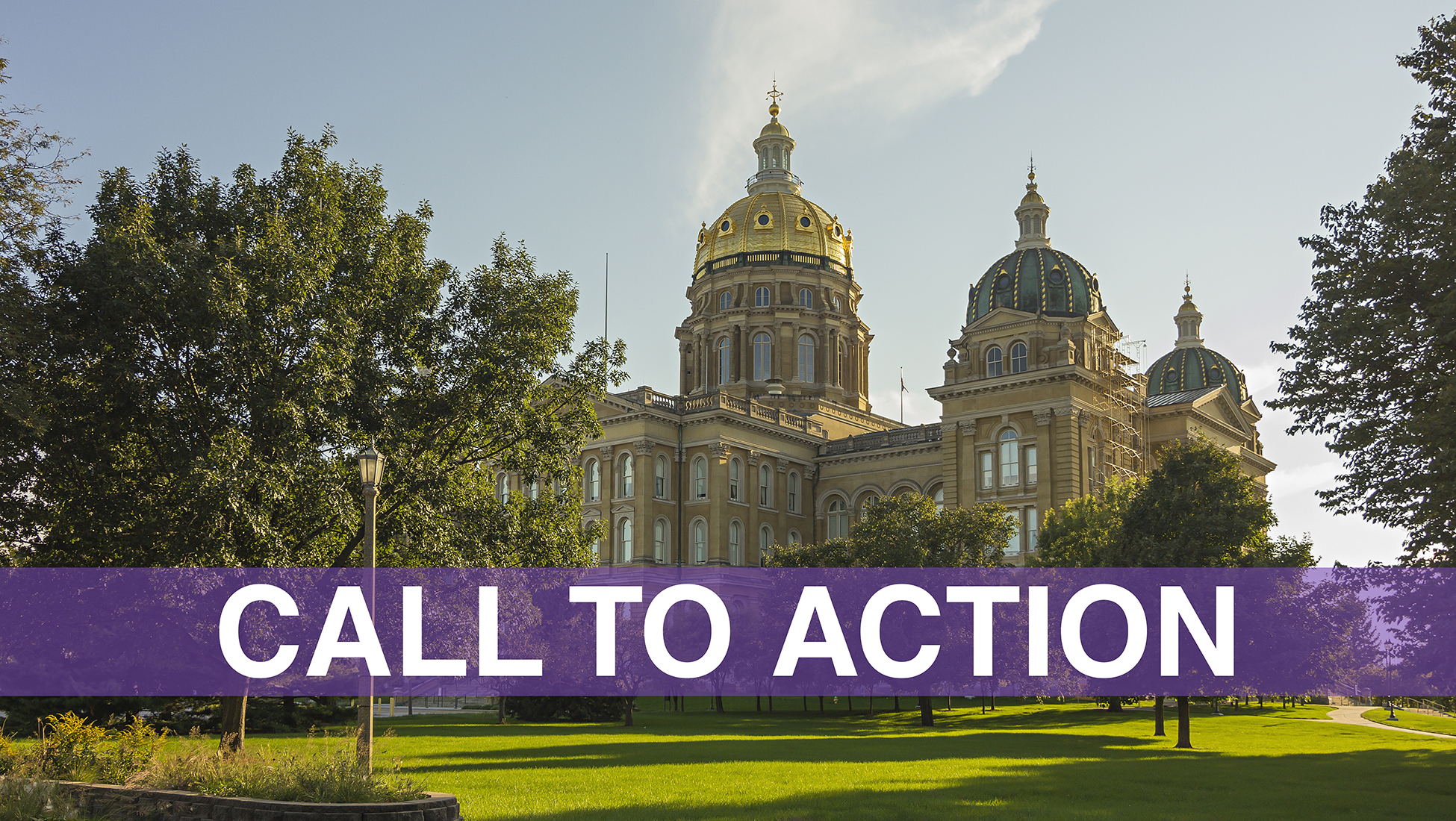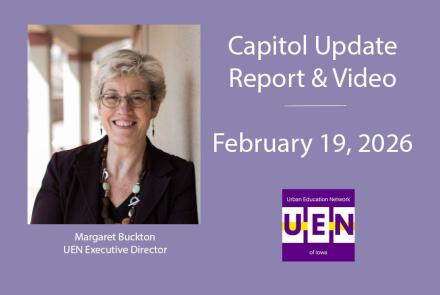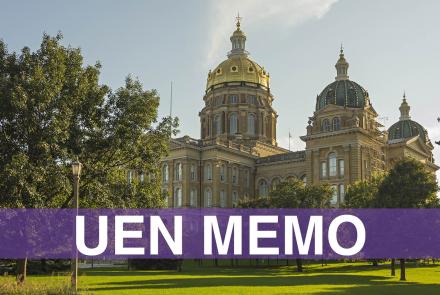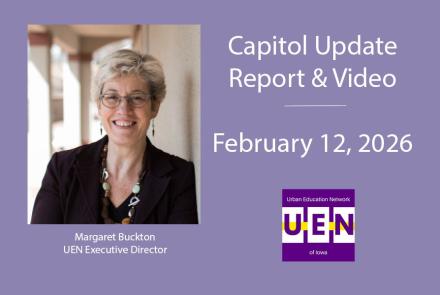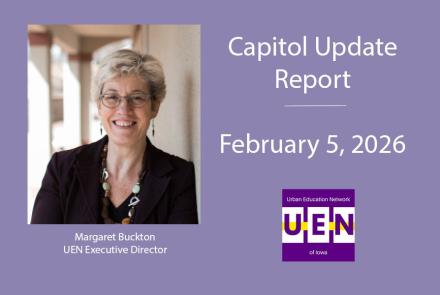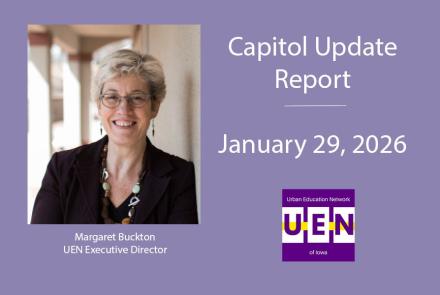Call to Action - Vouchers in the House - March 6, 2022
CALL TO ACTION
Education Savings Accounts (Vouchers) Are Not for Iowa
March 6, 2022
Big Picture: UEN was encouraging the legislature to take a balanced approach, position public schools for success, to consider measured tax relief that does not dampen the State’s future ability to adequately fund schools and adequate funding. With tax cuts and the low SSA rate of 2.5% already enacted, we are more discouraged than ever that the state would consider funding a private voucher initiative that would send public dollars to private schools without accountability. Bills are being considered in both the House and Senate on vouchers, and as appropriations bills, are exempt from the March 18 funnel deadline. UEN is registered in opposition.
Updated Call to Action: This Call to Action concerns the Governor’s Omnibus Voucher bill currently in the House Appropriations Committee HSB 672, with the subcommittee of Reps. Wills, Ehlert and Holt assigned. They have a meeting scheduled for noon on Tuesday, March 8. If this subcommittee moves it forward, the entire House Appropriations Committee would be the group of legislators requiring specific outreach. See that list of Committee members below. This bill is the entire Governor’s Proposal, identical to SF 2369. The House Education Committee had originally considered two bills with the divisions other than vouchers, with those bills now on the House Calendar as amendments are being discussed (HF 2498 and HF 2499).
Status in the Senate: The Governor’s Parent Choice Bill, SF 2369, has been approved by both the Senate Education and Appropriations Committees. It is now on the Senate Calendar.
Call your House Appropriations Committee representative between now and Tuesday at noon. Stress the following:
- Public funds require accountability and a level playing field. These bills specifically state that private schools do not need to change application or academic procedures to accept vouchers. They also say that nothing in these bills is to be construed as giving the DE or public schools any authority to impose requirements on private schools (such as accepting all students, providing special education services, or working with students below grade level.)
- This is a slippery slope toward a more expansive voucher system. In other states, they started with similar proposals, that grew bigger along the way. Homeschool parents testified at both Senate Subcommittee meetings, already asking for expansion. The unparalleled growth of school tuition organization (STO) tax credits in Iowa is good evidence that expansion will happen here.
- Iowa already has school choice. With unlimited open enrollment, STO support for tuition to private schools, virtual academies and two kinds of home school assistance (now including tuition and textbook tax credits for home school parents). Interesting that there were no parents at the subcommittees testifying that their children could not access another school choice opportunity.
- This is a costly commitment; beginning at $55 million and potentially growing to half a billion if expanded, as a time when the priorities of tax cuts have already been enacted. The state is struggling to meet the funding requirements of public education. It is ill advised to provide financial support to a second education system.
Bill Provisions and UEN Rationale and Position:
HSB 672 has many provisions that UEN opposes that are overbearing and difficult to administer at the school level, others not for Iowa and some provisions that we are working to improve in the House’s HF 2498 and HF 2499. Each Division below is described with the corresponding bill number. HSB 672 is referred to as an “omnibus bill”, which includes several big policies at once. We apologize for the length of this Call to Action, but there are a large number of actions included in the bill. Comments below are made to each of the six divisions:
Division I Transparency and State Standards and Removing Library Books (also in HF 2499): this part of the bill requires public schools to post a course syllabus or written summary of materials to be taught in each class in the school district, sortable by subject area, grade level and teacher. The district is also required to post how each class in the district meets or exceeds Iowa Code 256.11 education standards, sortable by subject area, grade level, and teacher. (The “sortable” requirement would require schools to develop and maintain costly software and days of training and uploading of materials by teachers.) Titles of all education materials for each class, procedures and policies to select materials at all levels of the school, list of all library books, too. DE is required to develop a flowchart of procedures and policies to request removal of a book from the library and districts must post it. This division also requires the annual audit to determine compliance with this section and requires the DE to withhold state foundation aid for every day the district is not in compliance. The bill also identifies timelines for district review of a parent request to remove a library book and allows the parent to appeal the district determination to the school board, and then to the State BOE.
UEN Rationale for Opposition to this division: this is an unfunded mandate and overly prescriptive. School boards already have policies regarding parent requests to remove books or review curriculum materials. The appeal to the state board does not specify the grounds by which the state board would overturn a local decision. UEN districts do not have the technology resources to create the searchable software necessary to comply and would likely have to contract with technology service providers in order to post this level of sortable detail. This would require an additional FTE administrative position in nearly every school to monitor web sites, instructional materials use and provide ongoing training. We are also concerned that the requirement to post on Aug. 23 and Jan. 15 would hamstring teachers who need to be fluid and adjust instruction based on what each group of students in their classroom know and are able to do. UEN opposes this division.
Division II Education Savings Accounts (Vouchers): this part of the bill allows students attending an accredited nonpublic school (defined in IC 285.16) as eligible, including: 1) household income below 400% of FPL (up to 5,000 scholarships), 2) student with an IEP (up to 5,000 scholarships), 3) students who received one in the prior year. If not all 5,000 slots are claimed in either category, additional scholarships may be given in the other. Application must include proof of enrollment into the private school. This version is much bigger than last year's policy which would have only impacted students attending school in an attendance center identified as a school in need of assistance or comprehensive improvement by Iowa's compliance with the federal ESSA requirements (our bottom 5%).
Parents apply by Jan. 1, DE notifies parents by Feb.1. The scholarship amount is equal to the weighted enrollment the student would generate if enrolled in the public school without the property tax component (average state aid in the state). The funds can be used by the parents or student for tuition and other specifically mentioned expenses. Unlike last year’s policy, any balance of funds at HS graduation goes back to the state coffers (parents can NOT use funds for college after HS graduation.) If a student is expelled from the private school, the parent must pay the funds back. If the student withdraws due to change of residence and does not re-enroll in a private school, any prorated funds must be paid back. The bill specifically states that private schools do not have to change their enrollment or educational standards as a result of receiving funds from an ESA (example of uneven playing field as public schools take all students). There is an expedited timeline for fall of 2022, with parents applying by May 1 and DE notifying parents by June 1.
UEN Rationale for Opposition: Although we don’t know how many students will leave public school to take advantage of this voucher program, we assume most income-eligible kindergarten students will apply. Although this starts small, it will build as vouchers have in other states, until its price tag is likely more than half a billion. Additionally, loss of public-school students without notice until June 1 would impact staffing and budget decisions after those had already been determined for public schools. As students withdraw from the private school and likely reenroll in public schools, there is no return of funding. It goes back to the state, not the public school. See talking points below on why vouchers are not for Iowa, including lack of transparency, lack of accountability, and most importantly, public funds should not be spent for private purposes. If the theory is correct that competition improves public school outcomes, we have already done that with one of the broadest open enrollment laws in the nation, $20 million in school tuition organization tax credits and other tax credit supports for private school parents. UEN opposes this provision.
School Enrollment Supplement: this part of the bill appropriates the equivalent of about 30% of the SCPP multiplied by the number of voucher recipients beginning in FY 2024 into a fund for school districts with a budget enrollment of 500 or less.
UEN Rationale for Opposition: The Governor’s budget documents explained that small changes in enrollment can be very hard on small districts. We are concerned that large changes in enrollment in urban centers can also be disruptive of school staffing, services provided to students and the budgets that ensure both of those meet student needs. UEN districts also typically see students who enrolled in private schools return to the public school after the Oct. 1 count date. UEN schools serve them for the remainder of the school year and the next, before their enrollment triggers some state funding. UEN supports adequate state funding at 5.0% SSA for FY 2023, which would allow districts of all sizes to more adequately compensate staff and address workforce and childcare shortages. UEN districts share a common concern with many of our smaller school neighbors, that growing poverty and student need is not recognized by Iowa’s school foundation formula. Both large and small schools with increased poverty would benefit from a formula that provided funds to address those student needs, rather than basing a supplement merely on school size without regard to how many students are actually be served or how many needs are not being met. UEN opposes this provision.
Division III Social Studies Instruction: (included in HF 2499) this part of the bill requires high school students to pass the immigration and naturalization service’s test for citizenship with a score of 70% of the questions answered correctly in order to graduate. Students are allowed to take the test multiple times. Districts and private schools are allowed to adjust the test to meet a student’s IEP.
UEN Rationale for Opposition: Many high schools use the questions of this test in their instructional materials. However, requiring this mandate will result in some students not graduating, perhaps carrying over to the next school year in order to complete the requirement or dropping out altogether. The test may be unmanageable for students for whom English is not their primary language or for students who struggle with multiple-choice tests or suffer test anxiety. UEN believes in local control, that it is the role of the school board and community to determine how performance for graduation is assessed. UEN opposes this provision.
Division IV Private Instruction – Special Education: (included in HF 2498) this part of the bill eliminates the requirement that the AEA director approve a child with an IEP to receive competent private instruction (home school), allows a parent of a child with an IEP to request dual enrollment, and requires services to be determined and provided based on Iowa Code 256B and administrative rules.
UEN Rationale is undecided on this provision pending more information: we have questions about the workability of this provision. It is unknown if the student would come to the public school to receive the services required in their IEP or if school employees would have to deliver those services at the student’s home. If it’s the latter, we will be opposed to this section. That would be an expensive use of school district staff time that is already scarce with a shortage of special education teachers and paras. Any additional costs would be shifted to special education deficits which are paid with property taxes. UEN is currently undecided on this provision until we find out more.
Division V Open Enrollment: (included in HF 2498) this part of the bill allows the denial of an open enrollment request by either the sending or receiving district for a sibling or step-sibling of a student who open enrolls for good cause due to repeated acts of harassment of the student that the district cannot adequately address, the consistent failure of the school district meet the basic academic standards or serious health condition to also be appealed to the state BOE under section 290.1. It also allows that sibling to participate in varsity athletics without a waiting period (282.18 subsection 11). UEN is undecided on this provision.
Division VI Teacher Librarians: (included in HF 2498) this part of the bill specifies that a teacher librarian license shall not require a master’s degree.
UEN Rationale for Support: rural school, especially small schools that have one K-12 library, struggle to find teacher librarians to comply with the state mandated program. Elimination of the master's degree requirement should broaden the pool of qualified applicants. UEN supports this provision.
Talking Points: Oppose Vouchers
- Public money should be for public schools. Period. The public’s investment should be used to support public community schools which are open to all students regardless of race, religion, gender, socio-economic status and disability, not for a new entitlement program for parents who choose private education.
- Public funds require public accountability and transparency. Public schools are overseen by a publicly elected citizen governing board, are required to report academic results to the general public, have an annual public financial audit, and be transparent with all expenditures and decision-making. Private and religious schools are not held to that same public standard. Taxpayers have a right to know how their funds are being used, but are left in the dark about the use and impact of voucher funds.
- This bill is a slippery slope toward a costly and expansive voucher program: This voucher program may start small, but as we've seen in other states, once a program is established, it is easy to expand. This will pull more resources away from public schools.
- Uneven playing field: Private schools do not have to accept all students, do not participate in state testing or reporting, do not have to follow all of the same rules and regulations as public schools.
- Iowa already has significant parent choice: Open enrollment within district, virtual program within district, open enrollment to another public school district, good nonpublic schools (with significant tuition assistance for low-income families provided by school tuition organizations and expanded tuition and textbook tax credits last session), and two kinds of home school 1) competent private instruction (home school with support) or 2) independent private instruction (home school without support) both of which now qualify for the tuition and textbook tax credit. New charter school legislation and expansion of open enrollment good cause exemptions have also expanded choice. The additional benefit of one more choice for a few parents has larger negative consequences for students who remain in the school, for taxpayers and for the rest of the community.
The following links will take you to each committee member’s legislative page, with email address and often home or cell phone number so you can easily connect with them. Remember to be respectful and explain the impact these bills would have on your school and education for your students. Please be sensitive to using school email when contacting legislators who may prefer you use your personal email rather than school property for advocacy purposes.
- Gary M. Mohr (R, District 94), Chair
- Shannon Latham (R, District 54), Vice Chair
- Jo Oldson (D, District 41), Ranking Member
- Michael R. Bergan (R, District 55)
- Jacob Bossman (R, District 6)
- Holly Brink (R, District 80)
- Timi Brown-Powers (D, District 61)
- Dave Deyoe (R, District 49)
- Tracy Ehlert (D, District 70)
- John Forbes (D, District 40)
- Joel Fry (R, District 27)
- Chris Hall (D, District 13)
- Steven Holt (R, District 18)
- David Kerr (R, District 88)
- Ann Meyer (R, District 9)
- Brian Meyer (D, District 33)
- Norlin Mommsen (R, District 97)
- Todd Prichard (D, District 52)
- Kirsten Running-Marquardt (D, District 69)
- Ray Sorensen (R, District 20)
- Phyllis Thede (D, District 93)
- Phil Thompson (R, District 47)
- Dave Williams (D, District 60)
- John H. Wills (R, District 1)
- Gary Worthan (R, District 11)
Find other Representatives here: https://www.legis.iowa.gov/legislators/house
To call and leave a message at the Statehouse, the House switchboard operator number is 515.281-3221. You can ask if they are available, leave a message for them to call you back, or just leave a short message such as “Oppose HSB 672 Governor’s School Choice Vouchers.” (Legislators typically return to the Capitol by noon on Monday).
General Contact Information:
The following links will help you find contact information such as email address and often home or cell phone numbers, so you can easily connect with your legislators.
Find your Senator’s contact information here: https://www.legis.iowa.gov/legislators/senate
Find your Representative’s contact information here: https://www.legis.iowa.gov/legislators/house
If you don’t know who your Legislators are, find out by selecting your school district, through the interactive map, or by entering an address here: https://www.legis.iowa.gov/legislators/find


